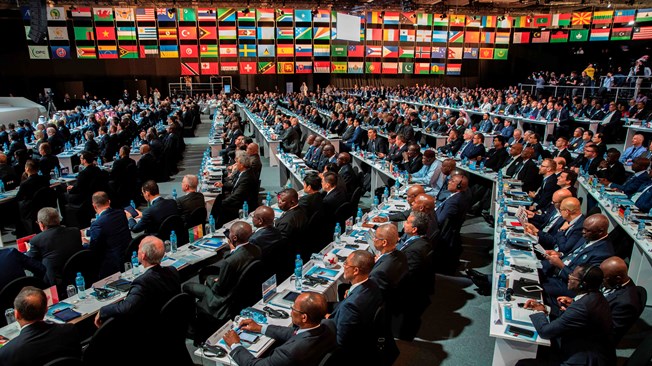By Samindra Kunti in Bangkok
May 16 – On Friday, Palestine, the 2027 Women’s World Cup, a series of amendments to the FIFA Statutes and racism will take centre stage at the FIFA Congress in the Thai capital.
The Congress represents the ultimate powpow in the global game as leaders of FIFA’s membership gather to discuss pressing matters in the sport. Palestine will be high on the agenda.
In March, the Palestinian FA (PFA) wrote to FIFA to propose an agenda item, demanding sanctions be taken against the Israeli FA (IFA) and its clubs because of the war in Gaza.
The executive committee of the Asian Confederation of Football (AFC) has unanimously backed Palestine and at the AFC’s congress on Thursday president Salman issued a rallying cry for Asia to get behind the Palestinian cause at the FIFA Congress where the PFA will demand to take the floor on Friday.
FIFA president Gianni Infantino called for unity in the football family, but is yet to take a clear position.
The Congress will also appoint the host nation of the 2027 Women’s World Cup. It’s the first time that the entire electorate will vote and the decision will mark the end of a long lobbying campaign by the European bid.
The triumvirate of Belgium, the Netherlands and Germany (BNG) have been on the road to sway federations with a compelling bid that seeks to spotlight sustainability. Much of their campaign focused on Africa and Asia, but BNG is confident that they have made inroads in the Concacaf region as well.
Brazil, the other bidding nation after the United States and Mexico dropped out to focus on the 2031 competition, have largely refrained from courting voters, but on the sidelines of Wednesday’s Council, Conmebol expressed confidence in their chances.
FIFA’s bid evaluation marked Brazil’s bid with an average score of 4.0 whereas the European bid got 3.7.
A raft of proposed amendments to the FIFA Statutes is also on the agenda and expected to be passed without any discussion, despite their contentious nature.
With the proposed amendments, FIFA open up the possibility of moving out of Zurich (articles 1 and 67.2), will be reintroducing a series of standing committees (articles 39-46), and allow for the awarding of two World Cups at the same time (article 68.3).
In 2016 – at the start of Infantino’s reign – FIFA passed reforms in the aftermath of the FIFAGate scandal, but former governance boss Miguel Maduro has issued a stark warning that the proposed amendments will roll back the years.
FIFA also wants to tackle racism, but the world federation’s plans to address the issue that often rears its ugly head in European Stadiums remain unclear. At the recent congresses of both UEFA, Conmebol and the AFC, Infantino issued a call on federations to come together and unite in the battle against racism.
In September 2016 – months into Infantino’s reign – FIFA however disbanded the Anti-Racism Task Force in a move that raised eyebrows. In a statement, FIFA said that “The FIFA Council unanimously supported the global stand against racism in football.”
The Congress will mark Mattias Grafstrom’s first as secretary general. On Wednesday, the FIFA Council confirmed the Swede, who grew up in part in the Netherlands, as the new number two in Zurich. He had been secretary general ad interim since October.
Grafstrom is expected to announce where FIFA’s Extraordinary Congress that will see Saudi Arabia crowned as host nation of the 2034 World Cup – subject to confirmation from the electorate – will take place later this year.
Contact the writer of this story at moc.l1722030124labto1722030124ofdlr1722030124owedi1722030124sni@i1722030124tnuk.1722030124ardni1722030124mas1722030124

